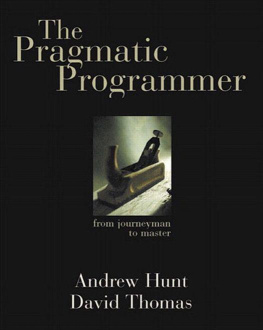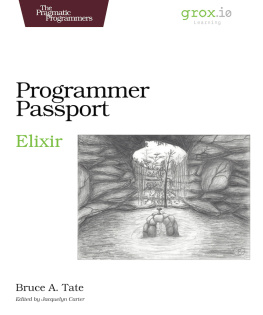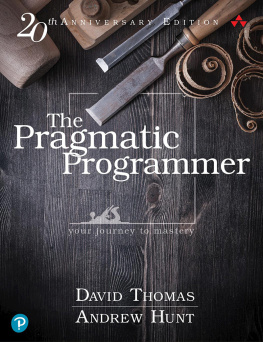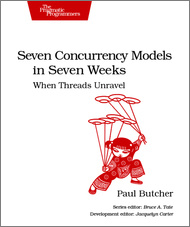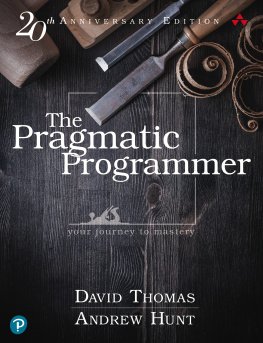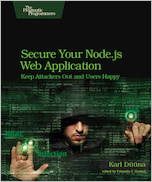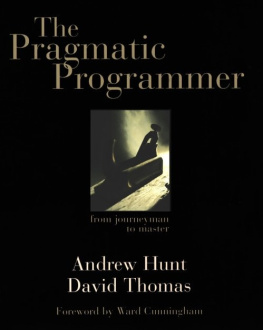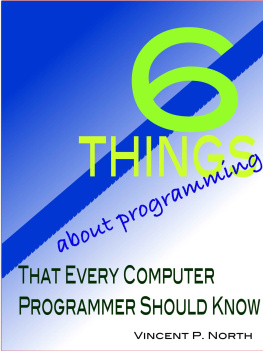Thomas David - The Pragmatic Programmer
Here you can read online Thomas David - The Pragmatic Programmer full text of the book (entire story) in english for free. Download pdf and epub, get meaning, cover and reviews about this ebook. City: Reading;Mass, year: 2000, publisher: Pearson Education Limited (US titles);Addison-Wesley, genre: Home and family. Description of the work, (preface) as well as reviews are available. Best literature library LitArk.com created for fans of good reading and offers a wide selection of genres:
Romance novel
Science fiction
Adventure
Detective
Science
History
Home and family
Prose
Art
Politics
Computer
Non-fiction
Religion
Business
Children
Humor
Choose a favorite category and find really read worthwhile books. Enjoy immersion in the world of imagination, feel the emotions of the characters or learn something new for yourself, make an fascinating discovery.

- Book:The Pragmatic Programmer
- Author:
- Publisher:Pearson Education Limited (US titles);Addison-Wesley
- Genre:
- Year:2000
- City:Reading;Mass
- Rating:4 / 5
- Favourites:Add to favourites
- Your mark:
- 80
- 1
- 2
- 3
- 4
- 5
The Pragmatic Programmer: summary, description and annotation
We offer to read an annotation, description, summary or preface (depends on what the author of the book "The Pragmatic Programmer" wrote himself). If you haven't found the necessary information about the book — write in the comments, we will try to find it.
The Pragmatic Programmer — read online for free the complete book (whole text) full work
Below is the text of the book, divided by pages. System saving the place of the last page read, allows you to conveniently read the book "The Pragmatic Programmer" online for free, without having to search again every time where you left off. Put a bookmark, and you can go to the page where you finished reading at any time.
Font size:
Interval:
Bookmark:
"The cool thing about this book is that it's great for keeping the programming process fresh. [The book] helps you to continue to grow and clearly comes from people who have been there."
Kent Beck, author of Extreme Programming Explained: Embrace Change
"I found this book to be a great mix of solid advice and wonderful analogies!"
Martin Fowler, author of Refactoring and UML Distilled
"I would buy a copy, read it twice, then tell all my colleagues to run out and grab a copy. This is a book I would never loan because I would worry about it being lost."
Kevin Ruland, Management Science, MSG-Logistics
"The wisdom and practical experience of the authors is obvious. The topics presented are relevant and useful.... By far its greatest strength for me has been the outstanding analogiestracer bullets, broken windows, and the fabulous helicopter-based explanation of the need for orthogonality, especially in a crisis situation. I have little doubt that this book will eventually become an excellent source of useful information for journeymen programmers and expert mentors alike."
John Lakos, author of Large-Scale C++ Software Design
"This is the sort of book I will buy a dozen copies of when it comes out so I can give it to my clients."
Eric Vought, Software Engineer
"Most modern books on software development fail to cover the basics of what makes a great software developer, instead spending their time on syntax or technology where in reality the greatest leverage possible for any software team is in having talented developers who really know their craft well. An excellent book."
Pete McBreen, Independent Consultant
"Since reading this book, I have implemented many of the practical suggestions and tips it contains. Across the board, they have saved my company time and money while helping me get my job done quicker! This should be a desktop reference for everyone who works with code for a living."
Jared Richardson, Senior Software Developer, iRenaissance, Inc.
"I would like to see this issued to every new employee at my company...."
Chris Cleeland, Senior Software Engineer, Object Computing, Inc.
From Journeyman to Master
Andrew Hunt
David Thomas

Reading, Massachusetts Harlow, England Menlo Park, California
Berkeley, California Don Mills, Ontario Sydney
Bonn Amsterdam Tokyo Mexico City
Many of the designations used by manufacturers and sellers to distinguish their products are claimed as trademarks. Where those designations appear in this book, and Addison-Wesley was aware of a trademark claim, the designations have been printed in initial capital letters or in all capitals.
Lyrics from the song "The Boxer" on page are by Arlo Guthrie, 1966, 1967 (renewed) by Appleseed Music Inc. All Rights Reserved. Used by Permission.
The authors and publisher have taken care in the preparation of this book, but make no express or implied warranty of any kind and assume no responsibility for errors or omissions. No liability is assumed for incidental or consequential damages in connection with or arising out of the use of the information or programs contained herein.
The publisher offers discounts on this book when ordered in quantity for special sales. For more information, please contact:
AWL Direct Sales
Addison Wesley Longman, Inc.
One Jacob Way
Reading, Massachusetts 01867
(781) 944-3700
Visit AWL on the Web: www.awl.com/cseng
Library of Congress Cataloging-in-Publication Data
Hunt, Andrew, 1964
The Pragmatic Programmer / Andrew Hunt, David Thomas.
p. cm.
Includes bibliographical references.
ISBN 0-201-61622-X
1. Computer programming. I. Thomas, David, 1956 .
II. Title.
QA76.6.H857 1999
005.1--dc21 9943581
CIP
Copyright 2000 by Addison Wesley Longman, Inc.
All rights reserved. No part of this publication may be reproduced, stored in a retrieval system, or transmitted, in any form or by any means, electronic, mechanical, photocopying, recording, or otherwise, without the prior written permission of the publisher. Printed in the United States of America. Published simultaneously in Canada.
ISBN 0-201-61622-X
Text printed in the United States on recycled paper at Courier Stoughton in Stoughton, Massachusetts.
25th Printing February 2010
For Ellie and Juliet,
Elizabeth and Zachary,
Stuart and Henry
As a reviewer I got an early opportunity to read the book you are holding. It was great, even in draft form. Dave Thomas and Andy Hunt have something to say, and they know how to say it. I saw what they were doing and I knew it would work. I asked to write this foreword so that I could explain why.
Simply put, this book tells you how to program in a way that you can follow. You wouldn't think that that would be a hard thing to do, but it is. Why? For one thing, not all programming books are written by programmers. Many are compiled by language designers, or the journalists who work with them to promote their creations. Those books tell you how to talk in a programming languagewhich is certainly important, but that is only a small part of what a programmer does.
What does a programmer do besides talk in programming language? Well, that is a deeper issue. Most programmers would have trouble explaining what they do. Programming is a job filled with details, and keeping track of those details requires focus. Hours drift by and the code appears. You look up and there are all of those statements. If you don't think carefully, you might think that programming is just typing statements in a programming language. You would be wrong, of course, but you wouldn't be able to tell by looking around the programming section of the bookstore.
In The Pragmatic Programmer Dave and Andy tell us how to program in a way that we can follow. How did they get so smart? Aren't they just as focused on details as other programmers? The answer is that they paid attention to what they were doing while they were doing itand then they tried to do it better.
Imagine that you are sitting in a meeting. Maybe you are thinking that the meeting could go on forever and that you would rather be programming. Dave and Andy would be thinking about why they were having the meeting, and wondering if there is something else they could do that would take the place of the meeting, and deciding if that something could be automated so that the work of the meeting just happens in the future. Then they would do it.
That is just the way Dave and Andy think. That meeting wasn't something keeping them from programming. It was programming. And it was programming that could be improved. I know they think this way because it is tip number two: Think About Your Work.
So imagine that these guys are thinking this way for a few years. Pretty soon they would have a collection of solutions. Now imagine them using their solutions in their work for a few more years, and discarding the ones that are too hard or don't always produce results. Well, that approach just about defines pragmatic. Now imagine them taking a year or two more to write their solutions down. You might think, That information would be a gold mine. And you would be right.
The authors tell us how they program. And they tell us in a way that we can follow. But there is more to this second statement than you might think. Let me explain.
Font size:
Interval:
Bookmark:
Similar books «The Pragmatic Programmer»
Look at similar books to The Pragmatic Programmer. We have selected literature similar in name and meaning in the hope of providing readers with more options to find new, interesting, not yet read works.
Discussion, reviews of the book The Pragmatic Programmer and just readers' own opinions. Leave your comments, write what you think about the work, its meaning or the main characters. Specify what exactly you liked and what you didn't like, and why you think so.



